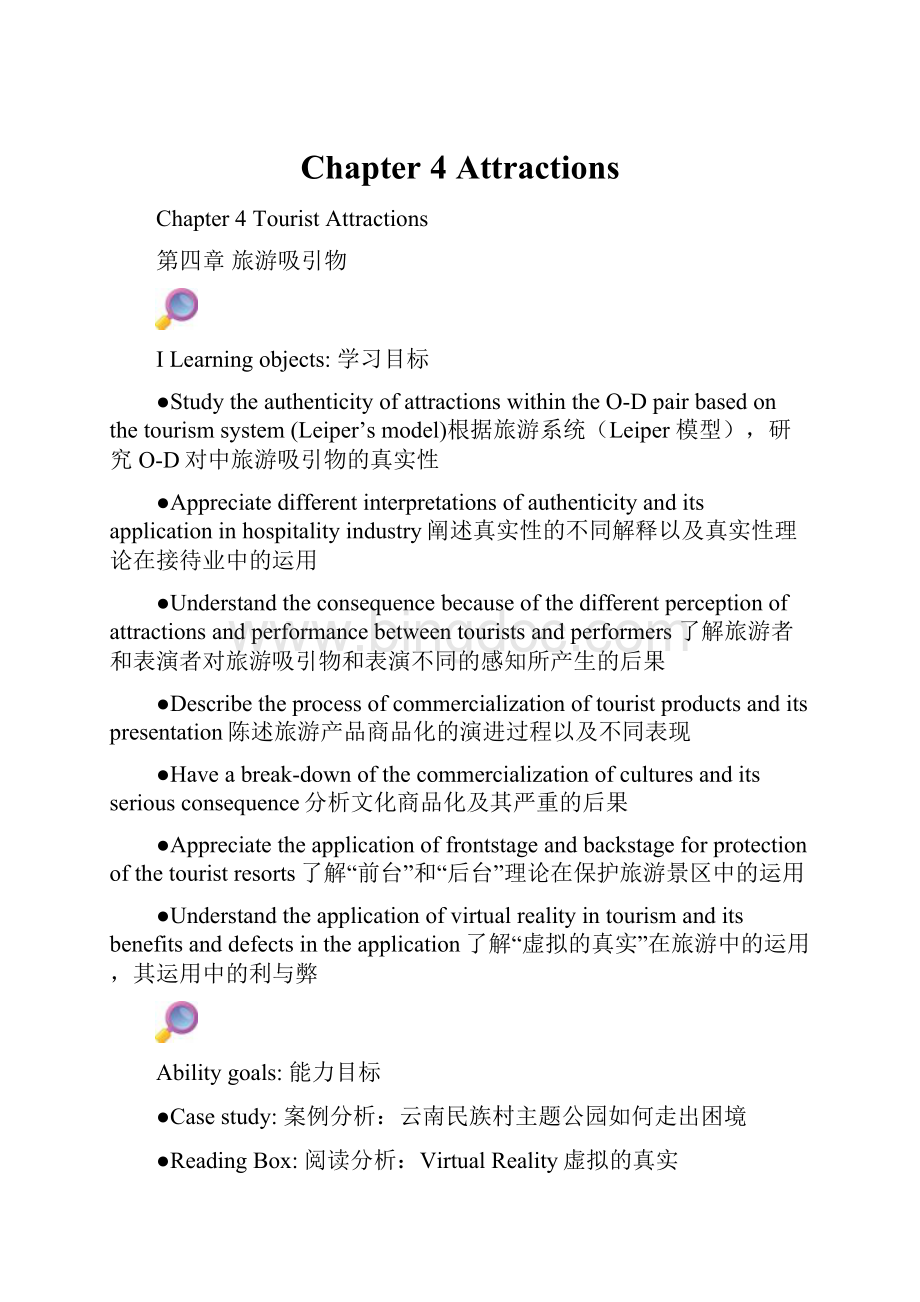Chapter 4 Attractions.docx
《Chapter 4 Attractions.docx》由会员分享,可在线阅读,更多相关《Chapter 4 Attractions.docx(26页珍藏版)》请在冰点文库上搜索。

Chapter4Attractions
Chapter4TouristAttractions
第四章旅游吸引物
ILearningobjects:
学习目标
●StudytheauthenticityofattractionswithintheO-Dpairbasedonthetourismsystem(Leiper’smodel)根据旅游系统(Leiper模型),研究O-D对中旅游吸引物的真实性
●Appreciatedifferentinterpretationsofauthenticityanditsapplicationinhospitalityindustry阐述真实性的不同解释以及真实性理论在接待业中的运用
●Understandtheconsequencebecauseofthedifferentperceptionofattractionsandperformancebetweentouristsandperformers了解旅游者和表演者对旅游吸引物和表演不同的感知所产生的后果
●Describetheprocessofcommercializationoftouristproductsanditspresentation陈述旅游产品商品化的演进过程以及不同表现
●Haveabreak-downofthecommercializationofculturesanditsseriousconsequence分析文化商品化及其严重的后果
●Appreciatetheapplicationoffrontstageandbackstageforprotectionofthetouristresorts了解“前台”和“后台”理论在保护旅游景区中的运用
●Understandtheapplicationofvirtualrealityintourismanditsbenefitsanddefectsintheapplication了解“虚拟的真实”在旅游中的运用,其运用中的利与弊
Abilitygoals:
能力目标
●Casestudy:
案例分析:
云南民族村主题公园如何走出困境
●ReadingBox:
阅读分析:
VirtualReality虚拟的真实
IIEmphasisanddifficultpoints(教学重点、难点)
知识要点
掌握程度
相关章节
authenticityoftheattraction吸引物的真实性
重点掌握
本课文与第1单元、第3单元、第6单元、第10单元、第12单元、第15单元相关内容有联系。
differentperceptionofattractions对吸引物不同的感知
重点掌握
objectiveauthenticity,constructiveauthenticityandexistentialauthenticity客观主义真实性、构建主义真实性、存在主义真实性
一般了解
culturalcommercialization文化商品化
重点掌握
frontstageandbackstage前台与后台
一般了解
IIIThearrangementofthischapter(教学安排)(4课时)
Chapter4TouristAttractions(4periods)
authenticityoftheattraction吸引物的真实性
1period
differentperceptionofattractions对吸引物不同的感知
1period
objectiveauthenticity,constructiveauthenticityandexistentialauthenticity客观主义真实性、构建主义真实性、存在主义真实性
1period
culturalcommercialization文化商品化frontstageandbackstage前台与后台
1period
IVTheteachingmethodofthischapter(教学方法)
讲授、头脑风暴、案例分析
VMajorteachingpointsofthischapter(教学要点)
1、旅游吸引物Touristattraction
我国通常将旅游吸引物称为旅游资源。
旅游吸引物的定义:
凡是能够激发旅游者的旅游动机,为旅游业所利用,并由此而产生经济效益和社会效益的一切事物和现象。
讨论:
Howdoyouunderstandtheimplicationoftourismresources?
怎样理解旅游资源的定义?
(1)作为旅游资源必须有两个必备条件:
•要能够激发旅游者的旅游动机
•要能够为旅游业所利用
(2)作为现实的旅游资源,必须要能够通过对其利用而产生经济效益和社会效益。
旅游资源的特点:
观赏性、区域性、综合性、文化性、独断性。
2、旅游资源分类Classificationoftouristresources
按资源的性质和成因:
自然旅游资源、人文旅游资源;
按资源的可持续利用潜力:
不可再生性旅游资源、再生性旅游资源;
按其发生学和形态学上的差异:
地文景观类、生物景观类、水域风光类。
Typesandexamplesoftourismresources旅游资源种类及实例:
2.1Naturalsites自然场址型
•Topography(Mountains,Beaches)
•Water(Lake,Sea,Waterfall,Spring,River,Snowandsoon)
•Wildlife(Captiveandnon-captive)
•Vegetation
•Protectednaturalareas
•Location
Extremeorcentralizelocationsareanaspectofthephysicalenvironmentthatfascinatesmanytourists,andasaresulttheymayhavethepotentialtobeexploitedastouristattractions.Forexample,thetownofRugby,Land’sEnd,theByronBayandsoon.
2.2Naturalevents自然节事型
•Birdimmigration
•Tides
•Climate
•Volcaniceruption
•Solareclipses
•Comets
Question:
Howdosetheclimateinfluencethetouristflow?
•Hot-to-coolflow
•Cool-to-hotflow
•Cool-to-coolflow
Question:
Whydoyouthinkthelocationisanattraction?
Giveexamples.
2.3Culturalsites文化场址型
•Pre-history
•History(Mountains,Battlefields,Heritagedistricts,Museums)
•Contemporary(Ethnicneighborhoods)
•Economicactivity(Wineries,Canals)
•Specializedrecreationalattractions(SRAS)(Golfcourses,Themeparks,Casinosandsoon)
•Retail(Mega-malls,Marketandbazaars)
2.4Culturalevents文化节事型
•Historicalre-enactmentsandcommemorations
•Sportingevents
•Worldfairs
•Festival
讨论:
Whydoesthetouroperatorstageculturalevents?
•complementaryoperation
•promotion
•overcomingthenegativeeffectsofseasonality
3.旅游资源的特性Attractionattributes
讨论:
WhydosomanytouriststravelinAustralia?
FiveattributesoftourismattractionsinAustralia:
•Quantity
•Quality
•Diversity
•Uniqueness
•Accessibility
根据旅游资源进行个性化的宣传Publicityandpromotionoftourismresources
四川:
“熊猫故乡”(突出唯我独有、中外闻名的旅游吸引物);
新疆:
“大漠风光、西域风情”(显示新疆独特的区域、地貌、民俗风情);
广西:
“桂林山水甲天下”(沿用家喻户晓的千古名诗绝句);
瑞士:
“世界的公园:
瑞士、瑞士、还是瑞士”(显示环境优美、永久中立、人人可游);
意大利:
“露天博物馆”(形象概括文明古国);
4、旅游吸引物的真实性Authenticityoftouristattractions
客观主义真实性:
关注旅游客体的真实性;
建构主义真实性:
在注重客体真实的基础上强调主体的差异性;
存在主义真实性:
关注主体体验的真实性。
4.1旅游研究中的客观主义真实性
旅游者评判旅游产品是否真实的标准在于“它们是否在本地由本地居民根据习俗与传统制造或表演”。
因此,客观主义真实性和“传统文化”、“原先的”、“原创的”、“独特的”等概念相联系。
4.2旅游研究中的建构主义真实性
建构主义者认为世界是多彩的、多元的、弹性的。
旅游场景并不是一种不动产,其真实性是观者赋予其上的一种价值评价。
旅游客体被旅游者体验为真实的,并不是因为事实如此,而是被当作真实性的符号和象征。
4.3旅游研究中的存在主义真实性
存在主义真实性不关心旅游客体真实性,重视旅游者的主观体验,强调旅游主体本真的存在状态,即将真实作为一种感觉,与对本真的自我体验结合起来,借助旅游活动或旅游客体寻找本真的自我。
5、真实性的感知Perceptionoftheauthenticity
5.1Authenticorcontrived
(1)Whichdoyouthinkisbetter?
Thegenuinetouristproductsorcontriveones?
(2)Doyoubelievethemoreauthentic,thebetterwhenyouvisitthetouristsite?
Itcanbearguedthateverything,includingfakecopiesoflocalart,is“authentic”or“genuine”becauseofthesimplefactthatitexistsandconveyssomekindofmeaning.
Figure5.1Residentandtouristcrossperceptionofattractions
Thefirstscenario,theattractionispresentedbyresidentsasauthenticandisperceivedassuchbythevisitingtourist.Thisistheidealoption,likelytopersistduringthefirsttwostagesofthecommoditizationmodeloutlineinsection4.1(positiveimpact).
Thesecondscenario,intermsofitsimplicationsforhost-guestrelationships,aperformanceispresentedascontrivedandisalsoperceivedassuchbythetourists(positiveimpact).
Thethirdscenario,theperformanceiscontrived.Buttouristsbelieve,throughinadvertent(e.g.frontstageisconfusedwithormisinterpretedasbackstage)ordeliberatereasons(e.g.frontstageisdeliberatelypurveyedasbackstage),thattheyareviewingsomethingthatisgenuine(negativeimpact).
Thefourthscenario,theperformanceisgenuine,buttouristsseeitasbeingcontrived,insomecasesbecauseofpreviousexperiencewiththeabovescenario.Residentsmaybeoffendedwhentouristsreacttoagenuinelocalceremony.
6、旅游的商品化Commoditizationoftourism
6.1Commoditization
Thegradualcommoditizationofadestination’sculture,oritsconversionintoacommodityinresponsetotheperceivedoractualdemandsofthetouristmarket,isamajornegativesocioculturalimpactassociatedwithtourism.
Fourstagesofcommoditization:
(1)Offergenuineartifactstotouristsasasignofhighesteem.
(2)Sellgenuineartifactsatlowprices.
(3)Cerementsarealteredandlargeamountsofcheaplyproducedsouvenirsaremade.
(4)Theintegrityoforiginalcultureisentirelylost.
6.2Measurestakenagainstthecommoditization
Questions:
(1)Whatarethefrontstageandbackstage?
(2)Whatbenefitscanwegainfromthezoomingofthestages?
Frontstageisanareawherecommercialandpossiblymodifiedperformancesanddisplaysareprovidedforthebulkofvisitingtourists.Incontrast,backstageisanareasetasideforthepersonalorin-grouppurposesoflocalpeople.Itiswithinthebackstagethatthe“reallife”ofthecommunityiscarriedoutand“authentic”culturemaintained.Aslongasthedistinctionsaremaintained,thecommunitycantheoreticallyachievethedualobjectivesofincomegenerationfromtourismandthepreservationofthelocalwayoflife.
Waysofsettingupthebackstages:
(1)Donotentersignsthatattempttoconfinetouriststothefrontstage.
(2)Theareaisopenedtotouristsonlyduringcertainhoursandreservedforlocalsduringtheremainderofthetime.
(3)Thelocalgovernmentmayusezoningtopreventtheincursionoftourism-relatedactivitiesintobackstage.VaticanChurchinRomeisatypicalexample.
案例研究
案例1BhutanandMaldives
1.Bhutan
Questions:
(1)WhatarethecharacteristicsoftheBhutanindigenousculture?
(2)WhyistheBhutanindigenousculturefragile?
(3)WhatmeasuresdoesBhutangovernmenttaketominimizethesocioculuralcostoftheinboundtourism?
Theconcretemeasures:
(1)Governmentgivesquotaandlimitstouristarrivals.
(2)Mostofthecountryismaintainedasabackstage,whilethefrontstageisrestrictedtoafewvillages.
(3)TourguideescortstouristsallthewayinBhutan.
ThereasonsofsettingupthefrontstageandbackstagebyBhutangovernment:
Presently,BhutanisuniqueforthetraditionalBuddhistculture.Thedemonstrationeffectmaycausethe1780,000residentsofBhutantoabandontheirtraditionalclothingandfoodinfavorof“Western”fashionsandtaste.
Thebasicgovernmentpolicyistogainrevenuefromtourism,butthepriorityisgiventoprotecttheindigenousculture.
2.Maldives
Questions:
(1)WhatarethecharacteristicsoftheMaldivesindigenousculture?
(2)WhatmeasuresdoesMaldivesgovernmenttaketopromoteitstourismindustry?
(3)WhatarethesimilaranddifferentmeasurestakenbyBhutanandMaldives’
(4)government?
Whataretheconsequences?
Isolatingvisitorsfromresidents,promoting3Sresortsonselectedatollsfarfromthepopulationcentre.
Thegovernmentpolicyistoderiveasmuchrevenueaspossiblefromtourismwithoutincurringanysocio-culturalcosts
案例2云南民族村概况
云南民族村位于昆明市南部6公里滇池之畔,占地2000亩;南临滇池,北望昆明,西靠西山,湖光山色秀美无比。
现已建成开放的有傣族、白族等13个村寨和一个“摩梭之家”。
同时还有民族团结广场、民族博物馆、游艇码头、循环游览车等等的配套设施。
云南民俗村寨采用复原陈列的手法展示云南的民族风情,不同风格的民俗村寨分布其间。
1、什么是真实性?
旅游真实性研究的核心概念。
旅游学者主要从客体和主体两个角度分析了真实性的概念。
首先,“真实性”是旅游客体的真实,包括专家的客观标准下和旅游者感知中的客体真实。
其次,部分学者倾向与将旅游真实性理论建立在海德格尔关于“存在”(Being)的哲学基础上、关注旅游者以旅游体验为载体的“真实”的存在方式。
(1)客观主义真实性
关注旅游客体的真实性:
A、前台;B、后台;C、舞台真实
(2)构建主义真实性:
在注重客体真实的基础上强调主体的差异性
(3)存在主义真实性:
存在主义真实性不关心旅游客体真实性,重视旅游者的主观体验
东道主与游客对旅游吸引物真实性的感知
2、运用真实性理论分析云南民族村开发中的问题
3、云南民族村的舞台化启示
4、真实性视角下民俗旅游产品开发路径
(1)民族旅游要尽量体现旅游吸引物的真实性。
(2)同的旅游产品追求不同的真实性。
(3)民族旅游要倡导与众不同的体验式旅游。
(4)过度商品化是民族旅游的最大威胁,要避免旅游过度商品化。
阅读与分析
即学即用:
请引用一案例进行分析。
VirtualReality
1、什么是虚拟现实?
Whatis